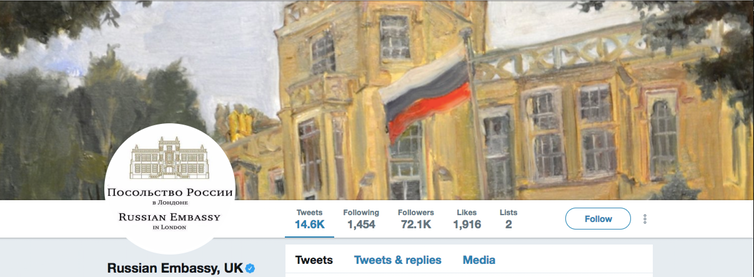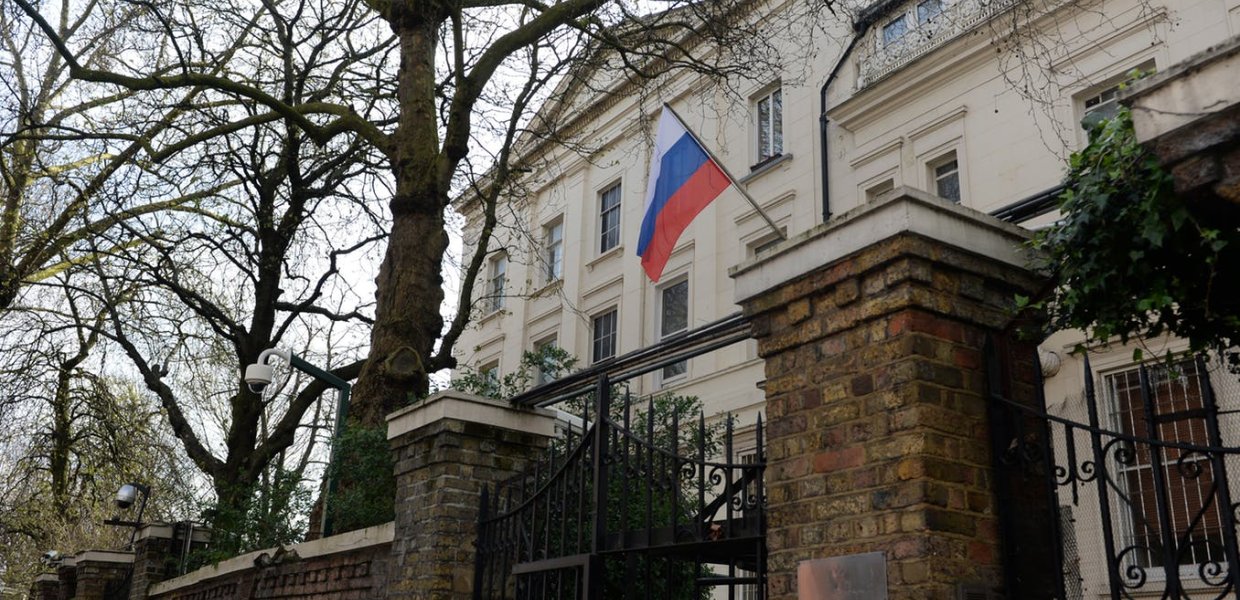International tensions continue to run high following the assassination attempt on former Russian spy Sergei Skripal. Accusations are flying between world leaders. And, in an unexpected twist, one embassy’s Twitter account is stoking the flames rather than helping to smooth relations.
@RussianEmbassy is pushing contention and propaganda, sending out a stream of confrontational messages ever since the Skripal incident.

The account is already infamous for its polemical approach. It has become an example of a new type of geopolitical strategy that centers around the power of digital diplomacy. But where other governments use embassy accounts as tools for improving international relations, the primary aim of @RussianEmbassy in moments of crisis seems to be circulating disinformation.
Strange new role
Embassy Twitter accounts have been taking on greater importance in recent years. They demonstrate a dramatic shift in the ways in which diplomacy is now performed. They are useful sources of information for citizens living abroad — updating diasporic communities, expats and tourists on upcoming events and celebrations, and offering advice during political incidents and emergencies. They also do their bit for nation branding.
#NewESTHMA - getting to know her!
— UK in Estonia (@ukinestonia) September 1, 2016
Our new Ambassador seems to be a true British tea lover.
Follow her @TBubbearFCO pic.twitter.com/Jv908g00zC
But embassy Twitter accounts have a more controversial function, too. They can be used to orchestrate certain governments’ strategic narratives.
When Barack Obama expelled 35 Russian diplomats in December 2016, for example, @RussianEmbassy posted a picture of a “lame duck” alongside a tweet that said many will be “glad to see the last” of him.
President Obama expels 35 [Russian flag emoji] diplomats in Cold War deja vu. As everybody, incl [American flag emoji] people, will be glad to see the last of this hapless Adm. pic.twitter.com/mleqA16H8D
— Russian Embassy, UK (@RussianEmbassy) December 29, 2016
Amid rising tensions between Russia and the West over LGBTQ rights, the account was used to portray Europeans as “gay pigs” confined to concentration camps — apparently an attack on “Western values”.
If Russia is in decline, why worry? Maybe, real worry is West's decline and that we manage things better? pic.twitter.com/WqG4uT5Pqt
— Russian Embassy, UK (@RussianEmbassy) October 22, 2016
It’s evident that the embassy’s social media strategy is one of belligerent controversy. Now, amid the fallout from the double assassination attempt on Skripal and his daughter, @RussianEmbassy has doubled down on its aggressive strategy.
It has released a torrent of remarkably combative tweets directed at the British media and government.
Kremlin spox Peskov: Russia, having nothing to do with Sergei Skripal poisoning, is ready to cooperate with UK, but sees no reciprocity. UK media proved their “quality” – no more trust in them. pic.twitter.com/YM0fGt12L5
— Russian Embassy, UK (@RussianEmbassy) March 14, 2018
The media, it claims, has shown its “quality” by accusing Russia of involvement and cannot be trusted. It even asked who will hold the British government accountable for “groundlessly wrecking relations” with Russia.
The tweets have increased in intensity as international pressure has built. The first few Skripal-related messages were fairly measured, but the feed soon descended into the conspiratorial. There were dark warnings about impending investigations and sanctions.
Presumption of innocence 2.0: no idea what happened, no idea why it happened, but Russians are to blame. pic.twitter.com/JmK9tNgd3i
— Russian Embassy, UK (@RussianEmbassy) March 7, 2018
The account eventually deteriorated into outright “whataboutery” — questioning why the Foreign Office is talking about Skripal but has nothing to say about far-right marches in Ukraine.
These seemingly erratic messages have a coherent objective: to subvert what the embassy perceives as incessant attacks from Western governments and media against the Russian state. As the British government prepared to take punitive measures against the Russian government, the embassy again hit back with an unambiguous tweet that threatened retaliation.
6/7 Any threat to take “punitive” measures against Russia will meet with a response. The British side should be aware of that. pic.twitter.com/DFAaB5orQE
— Russian Embassy, UK (@RussianEmbassy) March 13, 2018
The future of ‘Twiplomacy’
Gone are the days of relying on back channels to negotiate diplomatic disputes. Embassy Twitter accounts now play an important role on the international stage, and are harnessing so-called “Twiplomacy” with mixed results.
But a worrying precedent is being set for future diplomatic relations. @RussianEmbassy is still fundamentally the digital embodiment of a diplomatic mission based in an overseas territory. Diplomats are increasingly turning to social media as a useful vehicle for progressing diplomatic relations. But they may also be coerced in asserting certain geopolitical narratives by their governments. A single tweet can turn international relations sour. Rival governments can even slide into Twitter wars.
The temperature of [Russian flag emoji] [British flag emoji] relations drops to ➖[“2” emoji] [“3” emoji], but we are not afraid of cold weather. pic.twitter.com/mand9YyoaE
— Russian Embassy, UK (@RussianEmbassy) March 14, 2018
It’s true that @RussianEmbassy has become something of a viral hit thanks to its unorthodox and even humorous approach to a traditionally staid topic — but it is not acting in a bubble. The impact on diplomatic relations may be as significant as communications made through more traditional diplomatic channels.
The grey area that social media occupies means that accounts such as @RussianEmbassy can act with a brazenness and impunity that would not be acceptable for diplomats and ambassadors. With no real arbiter over “Twiplomacy” and its norms, we can expect @RussianEmbassy to remain unaccountable for its conduct.
While social media accounts can certainly bridge the distance between embassies and the citizens they serve, this is one shift that may end up harming more than helping.
This was co-authored by Nicholas Robinson PhD Candidate in the Centre for Doctoral Training (CDT) in Cyber Security, Royal Holloway.
